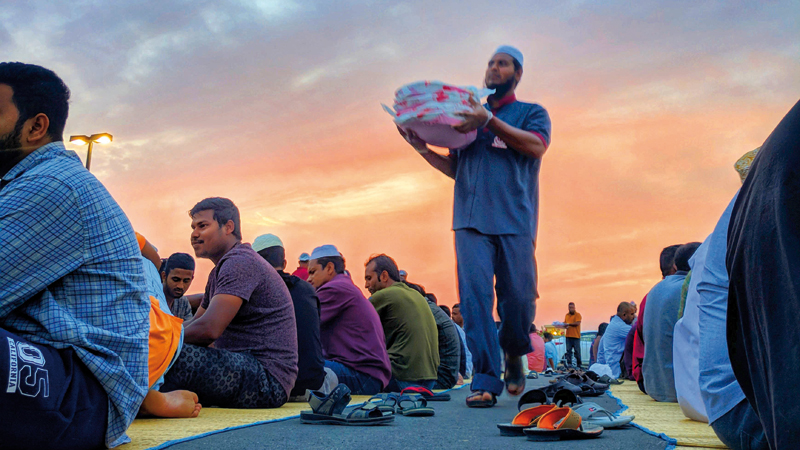


Hardly one will find any mosque, club or other community places where community Iftar is not happening in Salalah. While most of the mosques are offering community Iftar on a daily basis, there are clubs, associations and community groups which are organising iftars on a weekly basis.
Ramadhan is the time when tradition is at its best. People love to cook traditional food and share them among their near and dear ones. It is evident even on larger scale because there are many groups which take help of cooks from restaurants and make bulk traditional food for community sharing.
There is a trend also in Salalah to have community iftar, usually sponsored either by some group or an individual. Many people here are so fond of community iftar that they hardly have time to have iftar at home.
Naif Ahmed Said al Shanfari, Chairman of Dhofar branch of the Omani Special Olympics Committee and a senior government official admitted that he loves to join in community iftars.
“I find this an opportunity to meet with people from different communities living in Salalah, as the true message of Ramadan is faith and brotherhood,” he said.
For several years, Al Shanfari is part of an annual community iftar in which more than 3,000 people from different communities gather and have iftar together. This year’s annual Iftar was held at Dhofar Club with the active participation of Kerala Muslim Cultural Centre.
“I love doing this because I see people from working class join and have a feeling of brotherhood,” he said.
Despite being the scale as high as 3,000 people, the iftar was well organised and included hot meals consisting of dates, fruits, snacks, and delicious biryani (a rice preparation made either with vegetables or meat).
Office-bearer of a community association admitted that demand for such gatherings is so high that organisers do not get free dates for this. “For example, clubs, associations or specific groups organise community Iftars when weekend starts on Thursday, Friday or Saturday. Thus people get only 12 days to organise such gatherings. Most of these days are booked, thus many groups organise community iftars even on weekdays,” he said.
Bait Fadhil Mosque in South Awqad is one such place where hundreds of low-income workers gather every evening not only to pray but also to break their fast after day-long fasting during Ramadan. They get a free fill of biriyani, chicken, some snacks, dates, yoghurt, and beverages every day. The whole process is managed by a group of volunteers, who take inspiration from an Omani gentleman Abdullah Bait Fadhil.
Not less than 350 people get free Iftar meals in tents in the same locality all through Ramadan. The system initiated by Abdullah has taken the shape of an institution, as thinking this to be a good cause many people have started giving donations to let the noble cause continue.
Oman Observer is now on the WhatsApp channel. Click here



